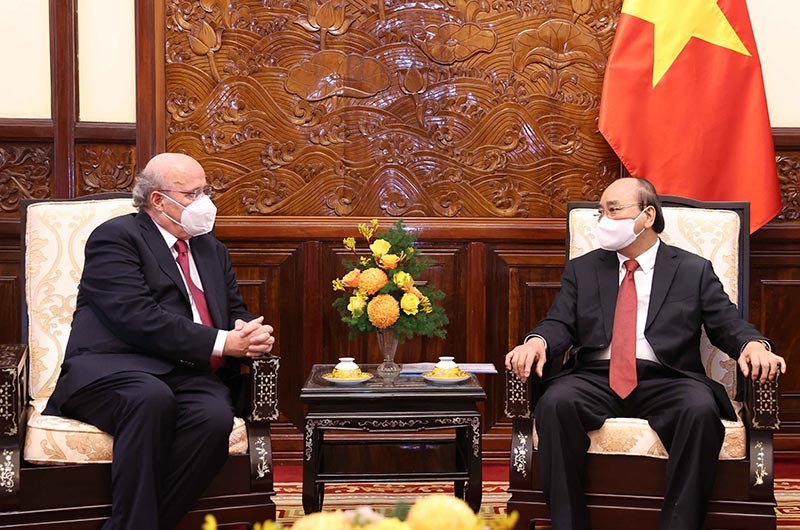
Ambassador Hans-Peter Glanzer: Vietnam, Austria entertain excellent bilateral relations
Latest
 |
| President Nguyen Xuan Phuc (R) and Ambassador of Austria Hans-Peter Glanzer. (Source: VNA) |
Could you please share with us the outstanding features of bilateral relations over the past?
Vietnam and Austria have excellent bilateral relations. Despite the COVID-19 pandemic and the ensuing the travel restrictions, we had a number of, mostly virtual, meetings over the last year, at the high political level between the presidents, prime ministers and foreign ministers. We are expecting high ranking visits both in Austria and Vietnam in the second half of this year and at the beginning of next year.
As one prime example of the remarkable development of our bilateral cooperation, I would like to mention the economic field: the trade volume has increased since 2000 tenfold with a high surplus for Vietnam and reached a new peak last year with an overall volume of 1,4 billion Euro. Around 50 Austrian companies have branches in Vietnam. This positive development is also reflected in the opening of an office in the Commercial Section of the Austrian Embassy in Ho Chi Minh City in 2019.
|
|
| Ambassador of Austria Hans-Peter Glanzer to Vietnam. (Photo: Austria's Embassy in Vietnam) |
Another example is the academic field: there are close to 30 cooperation agreements between Austrian Universities and their Vietnamese counterparts. Many of them participate in the ASEAN European Academic University Network (ASEA-UNINET) which was founded in 1994 by universities from Austria and Vietnam.
Currently, Austria is one of the 10 largest trading partners of Vietnam in the EU. What are opportunities and challenges in economic cooperation between the two nations in the post-pandemic recovery period?
Vietnam is also one of Austria’s most important trading partners in the region. Vietnam’s Free Trade Agreement with the European Union is further strengthening our dynamic development in the economic field.
In the recent meeting of the Joint Commission on Trade and Economic Cooperation at the level of Vice Ministers in Vienna, both sides agreed that cooperation in the economic field needs to be enhanced further.
There is definitely room for more investment from Austrian companies in Vietnam. We see prospects of increased cooperation in areas like energy, environmental technology, including renewable energy, vocational training, tourism, agriculture, sustainable – in particular urban - transport solutions and healthcare infrastructure.
Could you highlight significant projects and their meanings to celebrate the 50th anniversary of diplomatic relations between the two countries?
We are organizing a number of events, in particular in the cultural and economic field this year.
Together with the Ministry of Transport and Ha Noi University of Science and Technology, we organized an “Austria-Vietnam Future Mobility Workshop” in mid-June.
In July, an exhibition about Austrian composers of modern classical music was shown in the National Library of Vietnam. This exhibition was accompanied by concerts by musicians from the Vietnam National Symphony Orchestra and the Vietnam Academy of Music, among others, the very renowned opera singer Dao To Loan.
At the end of September, a Saxophon-Quartett from Austria will perform at the Music Academy in Hanoi and in the Conservatory in Ho Chi Minh City.
The cultural highlight will be a concert by the Vietnam National Symphony Orchestra, which will perform with the concertmaster of the Vienna Philharmonic Orchestra as well as two singers, one from the Vienna State Opera, a program with classical music from Austria in the Opera House in Hanoi on 26 November 2022.
Our commercial section is organizing trade missions, including business fora, with companies from Austria: on green technology took place in Ho Chi Minh City and the Mekong Delta in May; another on railway infrastructure in Hanoi in mid June and another one with a broad spectrum of companies is planned for October in Hanoi and Ho Chi Minh.
Being experienced in multilateral diplomacy, how do you evaluate Vietnam's multilateral diplomatic efforts, especially at multilateral organizations based in Vienna?
Vietnam pursues an active multilateralism in its foreign policy and shares, like Austria, a strong interest in a rule-based world order (e.g. UNCLOS). This approach is reflected in Vietnam’s very constructive engagement both at the regional and the global level. The successful chairmanship of ASEAN is proof of that.
The same is true for Vietnam’s efforts in the United Nations, which was also demonstrated by its successful membership in the UN Security Council.
Vietnam plays a very valuable role in the Vienna-based multilateral organizations. Vietnam is a strong supporter of all efforts towards nuclear disarmament and non-proliferation and was in the first group of states which ratified the Treaty on the Prohibition of Nuclear Weapons.













